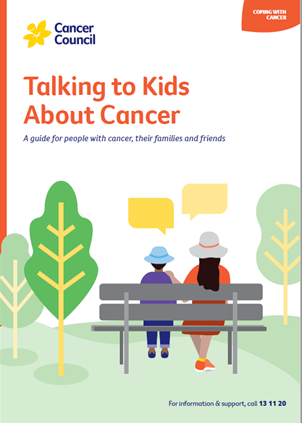- Home
- About Cancer
- Family and friends
- Talking to kids about cancer
- After treatment
- Family life after treatment
Family life after treatment
You may celebrate the end of cancer treatment and acknowledge that it has been a difficult period for everyone; this is particularly important for teenagers. Your children have lived with worry for months and may need your permission to relax and have fun again. Thank them for their role in keeping the family going and supporting you.
| Talk about your recovery | Let the family know how you’re feeling emotionally and physically so they understand if you’re not bouncing back as quickly as they expected. It may be helpful to remind your family that treatment effects are likely to last for a while after treatment finishes. |
| Share emotions | Keep using the emotions thermometer if you have found it helpful. Be open about your fears, such as if you’re feeling anxious before a check-up. This may encourage your kids to talk about their own fears. |
| Take recovery at your own pace | Do things at your own pace, and avoid any pressure to return to “normal” activities. You may want to ask yourself: Am I doing what fulfils me? Am I doing what I want to do? What is important to me? |
| Adapt family routines | Explain any changes to the family’s lifestyle to your children and negotiate where possible. During your recovery, you may be able to encourage your family to join you in making some healthy lifestyle changes – for example, you could do light exercise together, or make healthy changes to the kids’ diets as well as your own. |
| Manage expectations | Expect good days and bad days – for both the adults and the children in the family. Focus on one day at a time. |
Looking after yourself
If you are a parent who has finished cancer treatment, you may want to focus your attention on your children, but it is important to look after your own wellbeing as well. These strategies can help.
- Many cancer survivors join a group to meet people who understand what they have been through and how they’re feeling. Talking with other survivors can help you cope and will therefore benefit your kids.
- Read cancer survivors’ stories. Learning how other people have made meaning of a cancer diagnosis may help.
- Take part in a survivors’ event or attend a survivorship program. To find out what is available in your area, contact Cancer Council 13 11 20.
- Find out about Cancer Council’s Cancer Connect program by calling 13 11 20. They may be able to put you in touch with someone else with kids who has had cancer treatment.
→ READ MORE: Answering key questions about after treatment
Podcast: Family Dynamics and Cancer
Listen to more episodes from our podcast for people affected by cancer
More resources
Prof Jane Turner AM, International Psycho-Oncology Society President Emeritus,The University of Queensland, QLD; Taylor Baker, Consumer; Dr Ben Britton, Principal Clinical and Health Psychologist, Head of Psychology, Hunter New England Mental Health, NSW; Camp Quality; Dr Lisa Cuddeford, Head of Department, WA Paediatric Palliative Care Service, Perth Children’s Hospital, WA; A/Prof Peter Downie, Head, Paediatric Haematology–Oncology and Director, Children’s Cancer Centre, Monash Children’s Hospital, VIC; Dr Sarah Ellis, Clinical Psychologist, Kids Cancer Centre, Sydney Children’s Hospital, NSW; Malia Emberson-Lafoa’i, Consumer; Kate Fernandez, 13 11 20 Consultant, Cancer Council SA; Jane Gillard, Consumer; Mary McGowan OAM, International Childhood Cancer Advocate, VIC; Annette Polizois, Senior Social Worker, Women, Family and Emergency Care Team, Royal North Shore Hospital, NSW; Rhondda Rytmeister, Clinical Psychologist, HeadWayHealth (formerly Snr Clinical Psychologist, The Cancer Centre for Children, Westmead, NSW); Nadine Street, Head of Social Work and Social Welfare, HNE Mental Health Service, NSW; Warren Summers, Online Counsellor, Canteen, NSW.
We would also like to thank the health professionals, consumers, organisations and editorial teams who have worked on previous editions of this title, and we are grateful to the parents and young people whose real-life stories have added to the richness and relevance of this book.
We thank and acknowledge Dr Paula K. Rauch, MD, Founder and Director, Marjorie E. Korff PACT (Parenting At a Challenging Time) Program and Associate Professor of Psychiatry, Harvard Medical School, whose research and writing on helping parents talk to their children about cancer was used as source material for this book and has been adapted in several sections: pages 8–11, How children understand cancer; page 22, Answering key questions: Are you going to die?; page 26, Involving the school or preschool; pages 30–31, Hospital visits; and pages 36–37, Encouraging family time. We also thank the American Cancer Society for permission to use and adapt material on pages 8-11 from its book Cancer in Our Family: Helping children cope with a parent’s illness (2013); Macmillan Cancer Support for permission to use its book Talking to Children and Teenagers When an Adult Has Cancer (2013) as a source of information; Jessica Watt, Oncology Social Worker, The Children’s Hospital at Westmead, for her contribution on page 20, When another child has cancer; and Diane McGeachy, Hobart Counselling Centre, for contributing material for page 37, Spending one-on-one time.
View the Cancer Council NSW editorial policy.
View all publications or call 13 11 20 for free printed copies.

